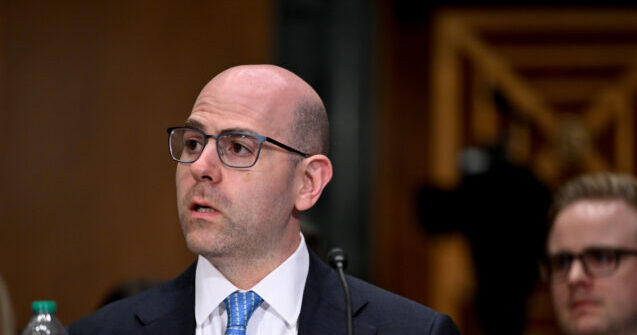Stephen Miran, President Trump’s nominee for an open Federal Reserve position, appeared to reassure Republican lawmakers about his commitment to central bank independence Thursday, weathering a barrage of attacks from Democratic senators during his confirmation hearing.
Miran, who serves as chair of the Council of Economic Advisers, calmly defended his decision to take unpaid leave rather than resign from his White House role if confirmed as a Fed governor, explaining that the arrangement reflected legal counsel’s advice for what amounts to a four-month appointment ending in January.
“I intend to preserve that independence and serve the American people to the best of my ability,” Miran told the Senate Banking Committee, emphasizing his commitment to the Federal Open Market Committee’s autonomous decision-making process.
Republican committee members appeared satisfied with his responses and showed clear support for the nomination throughout the hearing, which was expedited to allow potential confirmation before the Fed’s crucial September 16-17 policy meeting.
“What we’re talking about here, Mr. Chairman, is restoring the independence of the Fed,” Senator Bernie Moreno (R-Ohio) said, expressing his satisfication with Miran’s answers to questions about the Fed’s involvement in DEI, climate, and pandemic spending. Miran said he did not think those subjects were proper concerns for the central bank.
Democratic senators engaged in a relentless series of name-calling and attacks on the nominee, with Senator Jack Reed of Rhode Island calling his leave arrangement “ridiculous” and Senator Elizabeth Warren of Massachusetts repeatedly characterizing him as President Trump’s “puppet.” Many of the Democrats on the committee appeared to see the hearing as a forum to please far-left special interest groups with cannonades against the Trump administration rather than to evaluate the views and qualifications of Miran.
“Your independence has already been seriously compromised,” Mr. Reed declared, while Senator Andy Kim of New Jersey suggested Mr. Miran would remain “beholden to the president” during his Fed tenure.
Mr. Miran methodically addressed each attack, firmly stating that no one had asked him to pledge support for lower interest rates and that his policy views would be guided entirely by economic data and independent analysis. His measured responses appeared to reinforce Republican confidence in his qualifications.
The nominee brings substantial economic policy experience to the role, having served in senior administration positions and authored thoughtful analyses of monetary policy challenges. His 2024 academic paper examining Fed accountability, while containing reform proposals that Democrats seized upon, demonstrated serious engagement with central banking issues.
Federal law requires board members to “devote their entire time to the business of the Board.” Miran’s said counsel advised that a temporary leave arrangement was appropriate for the brief appointment. Many Fed officials have gone on temporary leave from their employers—often universities—while working at the central bank, including Ben Bernanke and Janet Yellen, the predecessors to Fed Chairman Jerome Powell. In addition, Alan Blinder, Fred Mishkin, Jeremy Stein, and Lawrence Meyer were all officially on leave from university posts while they held positions on the Fed board. Adrinna Kugler, the Fed Governor who Miran would replace if confirmed, was on leave from Georgetown during her tenure at the Fed.
The confirmation hearing took place amid broader friction between the administration and Fed leadership. President Trump is separately pursuing legal action to remove Governor Lisa Cook over mortgage fraud allegations, which Ms. Cook disputes and has challenged in federal court.
Miran would fill a vacancy created when Kugler unexpectedly stepped down in August. If confirmed, he would participate in all major Fed policy decisions during a critical period as officials consider resuming interest rate cuts. But Kugler’s term expires at the end of January of next year.
The Fed faces complex decisions about monetary policy after pausing rate reductions in January. Officials are weighing signs of labor market softening against persistent inflation pressures, with current rates in a range of 4.25 to 4.5 percent.
Democratic opposition appeared largely driven by broader resistance to Trump administration appointees rather than specific concerns about Mr. Miran’s qualifications. Their confrontational approach contrasted sharply with Republican members’ focus on his economic expertise and policy credentials.
The Federal Reserve operates under a congressional mandate to pursue price stability and maximum employment, with decisions made by a 12-member committee that includes seven governors and five rotating regional bank presidents. The governors serve staggered, 14-year terms. This structure provides multiple safeguards against political influence from any single appointee.
Committee Republicans seemed confident that Mr. Miran’s extensive background and clear commitments to Fed independence made him well-suited for the role during this challenging economic period.
Read the full article here


